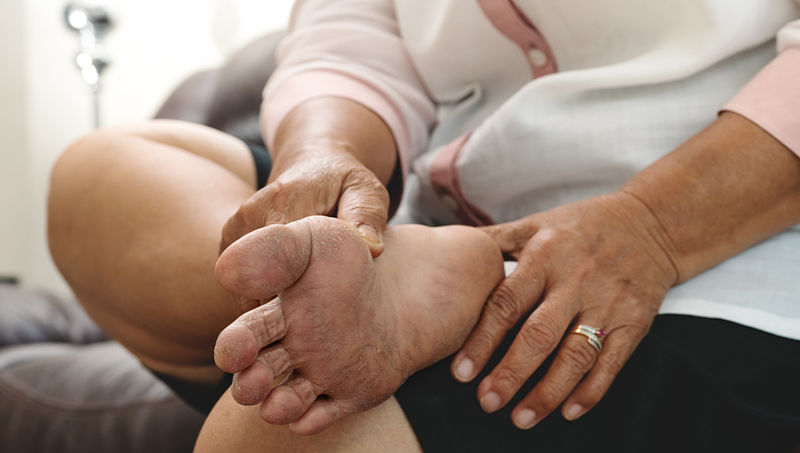Why Caring for Feet is Important for Diabetics

People with diabetes must maintain several good habits when it comes to personal health, and taking care of their feet is an important practice to maintain good health and avoid or cope neuropathy in the lower half of the body. It is highly recommended that diabetics with neuropathy make regular visits to a podiatrist for proper foot care.
Although diabetes affects every organ in the body, the feet are, in fact, one of the most vulnerable parts of the body that can be dramatically affected by diabetic neuropathy. Unfortunately, foot care doesn’t always make the top priority list when considering personal hygiene. It’s not just diabetics who tend to ignore their feet, but non-diabetics also have a tendency to ignore proper foot care. Still, 60 percent of non-traumatic lower-limb amputations on people 20 years or older occurred among people who were diagnosed diabetics (diabetes.org, 2015). According to Dr. Geetha Pandian, Professor of Physical Medicine and Rehabilitation at University of Texas Southwestern Medical Center, 55 percent of people with diabetes who have a lower extremity amputation will require a second amputation of another limb within 2-3 years (amputee-coalition.org, 2016).
If you are experiencing numbness, tingling, or sharp pains in your feet as a result of nerve damage from diabetes, you may be a candidate for neuropathy treatment at Peninsula RSI Chiropractic Wellness Center in Redwood City. Call (650) 547-3300 now to see if you qualify for treatment.
The feet are vulnerable in many ways. For example, “Diabetic foot ulceration can develop because of acute or chronic cutaneous compromise of the skin, arterial insufficiency, peripheral neuropathy, or a combination of these factors” (Diabetes Care, Reiber, Vileikyte, Bouko, et al., 1999). Additionally, when diabetes is not properly treated and a person’s blood sugar level remains high, the nerves in the lower extremities will weaken and vascular problems will arise. This restricts blood flow to the feet and the high glucose levels will eventually block proper function in the arteries of the feet, which affects the heart in the same way. Poor circulation and nerve damage in diabetics will typically result in the development of neuropathy in lower extremities. Fortunately, it usually takes anywhere from 7 to 9 years for diabetic neuropathy to occur, and it will occur quicker in diabetics who tend to put their health secondary when it should be first.
Nonetheless, people with diabetic neuropathy are at a higher risk of injury, wounds, and infections. In fact, according to a study published by the US National Library of Medicine, National Institutes of Health about infections in patients with diabetes, which is in accordance with the research published by Nicolau and Stein on the American Podiatry Medical Association, a recently acquired foot ulcer or wound has a very high chance of acquiring an infection such as staphylococci and the chances increase dramatically if the ulcer or wound is not treated properly (ncbi.nlm.nih.gov, 2012). Additionally, the reduction of feeling in the feet from diabetic neuropathy can also lead to injuries and wounds getting infected because a person is not able to feel the wound. The numbness and lack of sensation in the feet make a person increasingly vulnerable to burns, scrapes, and harmful cuts, which can all lead to greater problems.
Maintaining good foot hygiene is one way to prevent infection from getting comfortable. Scheduling regular visits with a podiatrist can also keep people well informed about what’s happening down there, especially, if a persona can’t feel or reach their feet. If you have diabetes and the sensation in your feet is becoming a regular problem or if you are experiencing tingling or sharp pains, you may be experiencing neuropathic symptoms.
Fortunately, the doctor at Peninsula RSI Chiropractic Wellness Center in Redwood City understand exactly what is happening in your feet and they here to help. Call our Redwood City office at (650) 547-3300 to schedule an appointment and begin treating your diabetic neuropathy today.



